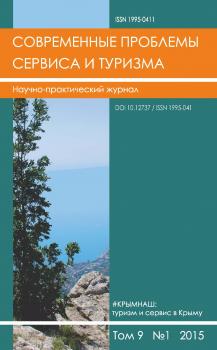Perm State National Research University
Perm State Agro-Technological University named after Academician D.N. Pryanishnikov
Sochi State University
Perm', Perm, Russian Federation
The article explores the prospects for combining benefits of active and educational tourism with the aim to create an attractive tourism product, especially for young people. The example of Vladimir region and Perm Krai shows that the synergy of active and educational tourism makes it possible to open new opportunities for the development of small Russian cities. It is concluded that inclusion of educational programs with elements of active tourism in regional event calendars allows ensuring a steady and more evenly distributed tourist flow to regions, and also contributes to the growth of youth’s interest in Russian small towns as tourist destinations and places for living. The research was supported financially by Russian Science Foundation (project № 17-18-01324) «Sustainable economic development of territories on the basis of network interaction of small towns and regional centers».
active tourism; educational tourism; small cities; sustainable development; Russia
1. Badzho R., Sheresheva M.Yu. Setevoy podhod v ekonomike i upravlenii: mezhdisciplinarnyy harakter // Vestnik Moskovskogo universiteta. Ser. 6. Ekonomika. 2014. №2. C. 3-21.
2. Vlasova T.I. Aktual'nye problemy razvitiya aktivnogo turizma v regionah // Turizm i rekreaciya: fundamental'nye i prikladnye issledovaniya. Trudy III Mezhdunarodnoy nauchno-prakticheskoy konferencii. M.: MGU im. M.V. Lomonosova, 2008. S. 20-25.
3. Egorov V.K. Molodezh' i turizm // Problemy razvitiya territorii. 2007. T.37. №2. S. 121-125.
4. Konovalova E.E., Kosareva N.V. Razvitie molodezhnogo turizma v Rossii // Servis v Rossii i za rubezhom. 2016. T.10. №1(62). S. 196-208.
5. Kotler F., Asplund K., Reyn I., Hayder D. Marketing mest: privlechenie investiciy, predpri- yatiy, zhiteley i turistov v goroda, kommuny, regiony i strany Evropy. SPb.: Stokgol'mskaya shkola ekonomiki v Sankt-Peterburge, Piter, 2005. 382 s.
6. Samygin S.I., Samygin P.S., Vereschagina A.V. Sport i zdorov'e rossiyskoy molodezhi v aspek- te nacional'noy bezopasnosti // Gumanitarnye, social'no-ekonomicheskie i obschestvennye nauki. 2015. №7. S. 58-62.
7. Serdyukova N.K. Vnutrenniy turizm: aktual'nye voprosy upravleniya i razvitiya // Terra Economicus. 2009. T.7. №3-3. C. 144-146.
8. Sheresheva M.Yu. Formy setevogo vzaimodeystviya v turizme i marketing partnerskih otnosheniy // Novaya ekonomika i regional'naya nauka. 2015. №2. S. 25-26.
9. Sheresheva M.Yu. Sobytiynyy turizm i nematerial'noe kul'turnoe nasledie (na materialah Vladimirskoy oblasti) // Sovremennye problemy servisa i turizma. 2016. T.10. №3. S. 48-62. DOI:https://doi.org/10.12737/21099.
10. Sheresheva M.Yu., Oborin M.S., Kostanyan A.A. Osobennosti ocenki kachestva zhizni nasele-niya malyh gorodov // Ars Administrandi (Iskusstvo upravleniya). 2017. T.9. №2. S. 289-311. DOI:https://doi.org/10.17072/2218-9173-2017-2-289-311.
11. Yakunin V.N. Vidy turizma: istoriografiya problemy // Rossiya - Kazahstan: prigranichnoe sotrudnichestvo, muzeyno-turisticheskiy potencial, proekty i marshruty k sobytiyam mirovogo urovnya: Sb. st. Mezhdunar. nauch.-prakt. konf. Vyp. 1. Samara, 2016. URL: https://regrazvitie.ru/ wp-content/uploads/2016/02/YAkunin.pdf (data obrascheniya: 01.07.2017).
12. Balaguer J., Cantavella-Jordá M. Tourism as a long-run economic growth factor: The Spanish case // Applied Economics. 2002. Vol. 34. №7. Pp. 877-884. DOI:https://doi.org/10.1080/00036840110058923.
13. Brian A. Importance of Tourism for the Economy of Bermuda // Annals of Tourism Research. 1995. Vol.22. №4. Pp. 918-930. DOI:https://doi.org/10.1016/0160-7383(95)00018-1.
14. Durbarry R. Tourism and economic growth: the case of Mauritius // Tourism Economics. 2004. Vol.10. №4. Pp. 389-401. DOI:https://doi.org/10.5367/0000000042430962.
15. Getz D. Event tourism: Definition, evolution, and research // Tourism Management. 2008. Vol.29. №3. Pp. 403-428. DOI:https://doi.org/10.1016/j.tourman.2007.07.017.
16. Gunn C.A., Var T. Tourism planning: Basics, concepts, cases. Milton Keynes, UK; New York: Lightning Source UK Ltd.; Routledge.
17. Jean-Pierre P., Perrain D. France, tourism. Encyclopedia of tourism. HAL, 2016.
18. Jurincic I. Carrying capacity assessment of Slovene Istria for tourism // WIT Transactions on Ecology and the Environment. 1970. Vol.84.
19. Kabanova E.E., Frolova E.V., Medvedeva N.V., Vinichenko M.V., Shimanskaya I.Y. Cultural and educational tourism in the Russian Federation: Basic problems and development resources // International Review of Management and Marketing. 2016. Vol.6. №5S. Pp. 206-210.
20. McCarthy B. Contiki Australia: providing superior value [case study]. Pearson Australia, 2010.
21. Mowforth M., Munt I. Tourism and sustainability: Development, globalization and new tourism in the third world. London: Routledge, 2015.
22. Ohe Y. Attitudes of Successors in Dairy Farms toward Educational Tourism in Japan. Advances in Culture, Tourism and Hospitality Research Marketing Places and Spaces. 2015. Pp. 33-44. DOI: 10.1108/ s1871-317320150000010003.
23. Rahman M.S., Osmangani A.M., Hassan H., Anwar A., Abdel Fattah F.A.M. Consumption values, destination cues and nostalgia on the attitude in the selection of destination for educational tourism: the mediating role of destination image // International Journal of Tourism Cities. 2016. Vol. 2. №3. Pp. 257-272. DOI:https://doi.org/10.1108/ijtc-06-2016-0013.
24. Ridderstaat J., Croes R., Nijkamp P. Tourism and long-run economic growth in Aruba // International Journal of Tourism Research. 2014. Vol. 16. №5. Pp. 472-487. DOI:https://doi.org/10.1002/jtr.1941.
25. Sharma A. Educational tourism: strategy for sustainable tourism development with reference of Hadauti and Shekhawati regions of Rajasthan, India // Journal of Business Economics and Information Technology. 2015. Vol. 11. №4. Pp. 1-12.
26. Slaughter L., Carr N.S., Oxley L. Tourism motives and youth: An analysis of holiday motivations of visitors to Contiki Great Keppel Island Resort, Australia // Asia Pacific Tourism Association Tenth Annual Conference. Asia Pacific Tourism Association, 2004. Pp. 988-998.
27. Tang C.F., Tan E.C. How stable is the tourism-led growth hypothesis in Malaysia? Evidence from disaggregated tourism markets // Tourism Management. 2013. Iss. 37. Pp. 52-57. DOI:https://doi.org/10.1016/j. tourman.2012.12.014.
28. Telfer D.J., Sharpley R. Tourism and development in the developing world. London, etc.: Routledge, 2015.
29. Tugcu C.T. Tourism and economic growth nexus revisited: A panel causality analysis for the case of the Mediterranean Region // Tourism Management. 2014. №42. Pp. 207-212. DOI:https://doi.org/10.1016/j. tourman.2013.12.007.
30. Webster C., Ivanov S. Transforming competitiveness into economic benefits: Does tourism stimulate economic growth in more competitive destinations? // Tourism Management. 2014. №40. Pp. 137- 140. DOI:https://doi.org/10.1016/j.tourman.2013.06.003.
31. Wilson J., Fisher D., Moore K. “Van tour” and “Doing a Contiki”: grand backpacker tours of Europe // Backpacker Tourism: concepts and profiles. Channel View Publications, 2008.





